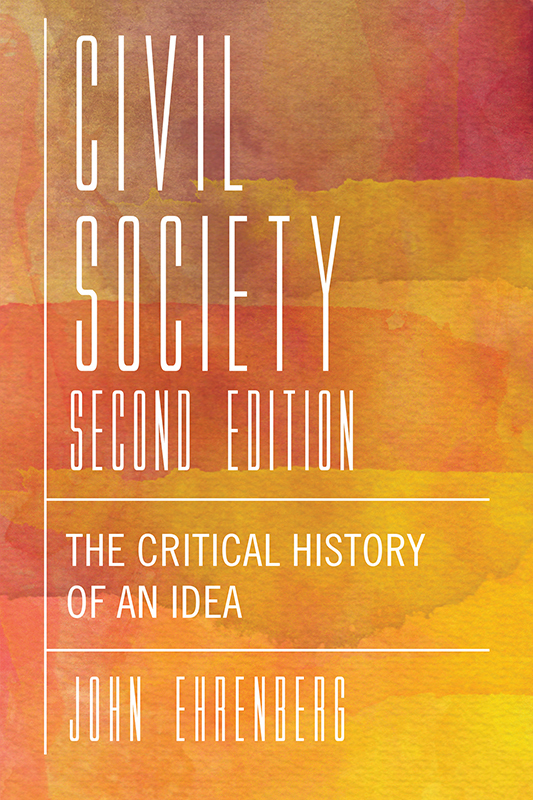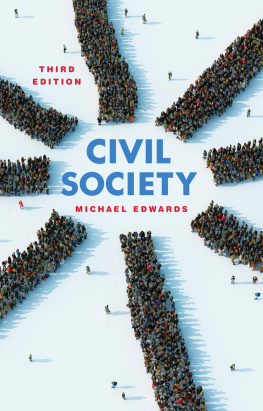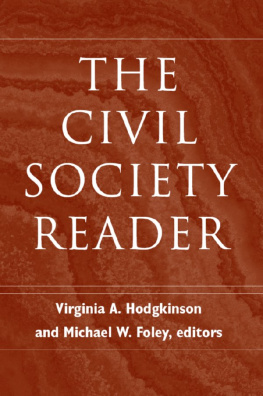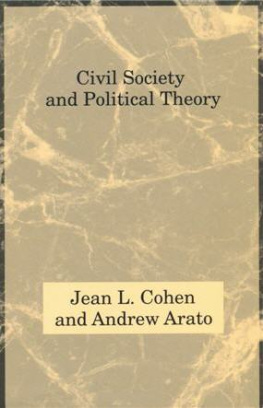
Civil Society
Civil Society
The Critical History of an Idea
Second Edition
John Ehrenberg

NEW YORK UNIVERSITY PRESS
New York
NEW YORK UNIVERSITY PRESS
New York
www.nyupress.org
2017 by New York University
All rights reserved
References to Internet websites (URLs) were accurate at the time of writing. Neither the author nor New York University Press is responsible for URLs that may have expired or changed since the manuscript was prepared.
ISBN : 978-1-4798-9671-4 (hardback)
ISBN : 978-1-4798-9160-3 (paperback)
For Library of Congress Cataloging-in-Publication data, please contact the Library of Congress.
New York University Press books are printed on acid-free paper, and their binding materials are chosen for strength and durability. We strive to use environmentally responsible suppliers and materials to the greatest extent possible in publishing our books.
Manufactured in the United States of America
10 9 8 7 6 5 4 3 2 1
Also available as an ebook
To Kathleen
Contents
Inequality and Democracys Uncertain Future
The last thirty-five years have witnessed historic levels of economic inequality, relentless attacks on the regulatory and redistributive functions of all levels of government, and the movement of civil society to the center of democratic theory and political discourse. These three impulses are different aspects of a single process of conservative ascendency. Economics, politics, and ideology have combined to dramatically reshape contemporary American life and change the way we think about equality and democracy. Embraced by Republican and Democratic politicians alike, earnestly debated in university forums and college courses, expanded on by political pundits, and elaborated in countless books and articles, the idea that civil society can enrich democracy by contesting state power has become an article of faith.
It is no coincidence that the contemporary understanding of civil societylocal activity and voluntary associationhas come to replace political commitment and state activity during a period of accelerating inequality. Nor it is a coincidence that its democratic core should be so uncritically accepted by such a broad swath of political, social, and moral opinion. There is wide agreement that tutoring children, volunteering in social movements, joining bowling leagues, and working in soup kitchens can revitalize communities and strengthen habits of good citizenship at a time when there is virtually no confidence that political activity or established institutions are up to the task. In an era of wealth concentration, political dysfunction, and ideological polarization, both political parties agree that civil society can do what politics cannot. The first President Bushs faith in a thousand points of light was a fitting introduction to President Clintons proclamation that the era of big government is over.
Barack Obamas election in 2008 seemed to indicate that a change was in the works, but the faith that civil society can revitalize democracy continues to shape American politics. In the absence of noble public goals, admired leaders, or general agreement, many observers have charted an alarming erosion of civic spirit and a corresponding decline in the quality of public life. An increasingly distressed literature has alerted the country to the damage done by cheapened standards of behavior, road rage, political dysfunction, microaggressions, inequality, and offensive jokes. Experts worry that an overworked, disengaged, and self-absorbed population has allowed its moral connections, social engagements, and political participation to atrophy. The concern is not limited to bad manners but has spilled over into political affairs and generated many suggestions about how public life could be improved in a period marked by fraying communities, widespread apathy, and unprecedented levels of contempt for politics. Driven by an uneasy sense of decline and animated by a deep suspicion of the state, a growing body of contemporary work hopes that civil society can provide a democratic counterweight to the broad political commitments of an earlier period.
But the view that local voluntary activity sustains democracy is only one way of understanding civil society. Ironically, the events that brought the notion of civil society to the center of contemporary political life conceptualized it in very different terms. In the early 1980s a broad series of civic forums, independent trade unions, and social movements began to carve out areas of political activity in the Eastern European countries of actual existing socialism. Their leaders talked of the rebellion of civil society against the state, and when they started coming to power in 1989 the stage was set for an explosion of interest in the West. Liberal political theory was revived in demands for law-governed states that would protect private life and public activity from the intrusive hand of meddling bureaucracies. It was not surprising that Eastern Europeans should conceptualize civil society in terms of limiting state power, or that its popularity in the United States should be expressed in the language of intermediate organization. Civil society meant constitutional republicanism in one area and denoted local volunteerism supported by informal norms of solidarity and mutual aid in another. Both bodies of thought sought to theorize it as a democratic sphere of public action because it limits the thrust of state power.
Eighteen years have passed since the first edition of this book, and some recent developments mark the limits of civil societys democratic potential as they simultaneously hint at a way forward. We know more than we did in 1999, and it is time to take note of historys recent lesson that local volunteerism and intermediate organizations are insufficient vehicles for democratic renewal in an era of accelerating inequality. More is required, and that more is broad, comprehensive political activity. The breathless faith that the energy of the Arab Spring and Occupy Wall Street would be enough to reinvigorate democracy has yielded to Black Lives Matters embrace of patient political organizing and presidential candidate Bernie Sanderss unambiguous orientation toward the state. Spontaneous protests against European austerity led to Syrizas and Podemoss turn toward national politics in Greece and Spain. The collection of organizations in global civil society helped alert the world to great danger even as it made possible the state-centered Paris Climate Change Conference. All these developments underline how important state power, comprehensive politics, and broad ideologies are to democratic theory and practice. This is particularly true now. The threat to democracy posed by historic levels of inequality is very potent, and civil society has proved unable to respond to it in the way its admirers have anticipated. Things are not as enthusiastic and celebratory as they were in the heady aftermath of European communisms collapse. There is considerably more to the category than meets the eye, and an explication of tradition can help us evaluate easy assumptions about its democratic potential.
This book examines the historical, political, and theoretical evolution of the way civil society has been theorized over two and a half millennia of Western political theory. Broadly speaking, three distinct bodies of thought have marked its developmentbut these are not hard and fast divisions, and considerable cross-fertilization has enriched each tradition. Reflecting its orientation toward broad categories of analysis, classical and medieval thought generally equated civil society with politically organized commonwealths. Whether its final source of authority was secular or religious, civil society made civilization possible because people lived in law-governed associations protected by the coercive power of the state. Such conceptions shaped the way civil society was understood for hundreds of years. As the forces of modernity began to undermine the embedded economies and universal knowledge of the Middle Ages, the gradual formation of national markets and national states gave rise to a second tradition, which began to conceptualize civil society as a civilization made possible by production, individual interest, competition, and need. For some thinkers, the Enlightenment opened unprecedented opportunities for freedom in a secular world of commerce, science, culture, and liberty. For others, civil societys disorder, inequality, and conflict falsified its emancipatory potential and required a measure of public supervision. However civil society was understood, it was clear that the world could no longer be understood as fused commonwealths. Civil society developed in tandem with the centralizing and leveling tendencies of the modern state, and an influential third body of thought conceptualized it as the now-familiar sphere of intermediate organization and association that serves liberty and limits the power of central institutions.
Next page






